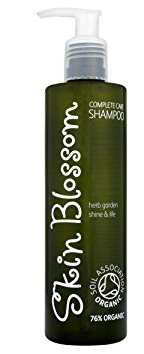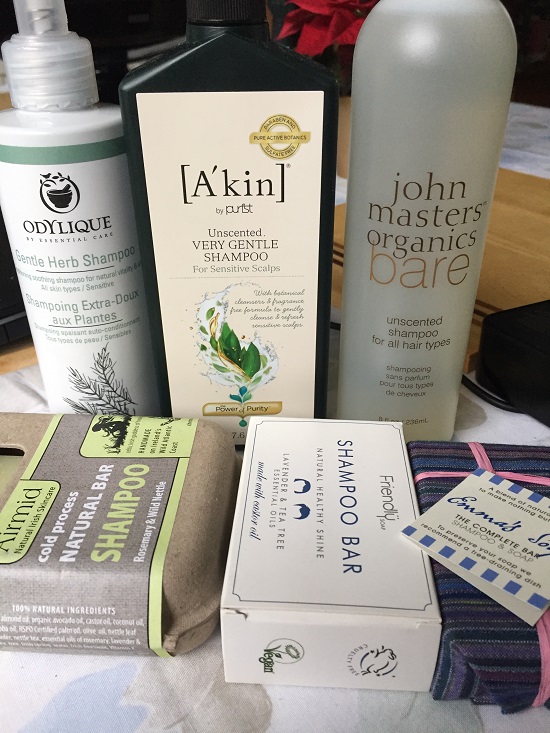Psoriasis is a skin condition that also affects the scalp in an estimated 50 percent of cases. Learn more about its treatment with medicinal shampoos.
Eczema / Psoriasis News From Medical News Today



Tag Archives: shampoo
Eczema Shampoo – Is My Shampoo Causing My Eczema?
Many people suffer from various forms of scalp disorders such as dandruff and a flaky scalp, to the more serious conditions such as scalp dermatitis and eczema. Those individuals may reach for the popular eczema shampoo or other types of medicated shampoo to treat the problem, however, this is not always the answer. Eczema shampoo does not necessarily have to be in the form of a medicated shampoo and if you are using this without any success, this article may shed some light.
There are many reasons why you may develop eczema on your scalp such as nutrient deficiencies and weather changes, but one of the more increasing causes for scalp eczema is in your existing shampoo.
Of course, if your doctor has prescribed you with a medicated shampoo then that is a different matter, however, if you are self prescribing or just continuing to use your every-day shampoo, you may find that these can aggravate rather than help your situation.
All non-organic shampoos both medicated and non-medicated contain harsh chemicals, most notably sodium-laureth sulphate, which is used to facilitate the lathering. Research has shown that these chemicals can cause scalp, eye and follicle irritation which can worsen an existing problem or cause new problems. Most of us have used these shampoos our entire life and some may have always had scalp problems where others have more recently developed them.
Sensitive skin can develop problems at any time, so in this instance, it is a good idea to obtain an organic shampoo which contains no unnatural ingredients. If your scalp begins to clear up, then you can be sure that the cause of your scalp condition was down to your shampoo, if not, then you can begin to find out the real cause of your scalp problems.
As stated, this could be due to an imbalanced diet with nutrition deficiencies such as the B vitamins which among other uses, are involved in scalp health. Other causes may include allergies to hair products or other environmental issues such as weather extremes. Using medicated shampoo, may indeed, temporarily stop the scalp condition, but unless the root cause is determined, then it may return before too long.
There are many effective and natural methods to clear and prevent scalp eczema. Finding the best eczema shampoo can be very difficult and the results may not always be the desired outcome. For a full guide to scalp health and maintenance, continue to Remedies For Eczema.
Natural, non-irritant shampoo for dry, eczema scalps
One of my real bugbears and struggles is finding good, natural shampoo that doesn’t make my scalp dry, itchyand sore.
I’ve blogged about this a great deal.

No longer available – Skin Blossom Herbal Shampoo
And this year I am mourning the demise of my favourite shampoo, Skin Blossom Organic herbal shampoo which has been discontinued… 
I have been searching the globe for bottles of this shampoo and the stocks appear to have finally depleted to zero.
So the last bottle is all the sweeter, and when it’s finished I will be trialling a whole host of new shampoos to find my next favourite.
It’s a bit like hair dressers. Once you find a good one you want to stick with them. I don’t like too much change and being forced to change with no choice in the matter is frustrating.
But not altogether a bad thing as you can see from the lovely products I have to try next!
Six Shampoos to try…

Lots of new natural, organic and freefrom allergen shampoos to try
- Odylique Gentle Herb Shampoo – I know I love this one and have been meaning to buy some for months so this was an obvious purchase.
- A’Kin Unscented very gentle shampoo – I’ve been aware of A’Kin but just never come across it when shopping for shampoo so this one was up there. I hope it lives up to my expectations!
- John Masters organics bare shampoo – a new one for me, but I thought I’d try it so I avoided paying postage buying the other two

- Airmid – cold pressed natural bar shampoo – this one will be great for travelling and I will let you know how I get on with it.
- Friendly Soap – Shampoo Bar – Never heard of this before but it was one of the entrants in the FreeFrom Skincare Awards. Another for travelling.
- Emma’s soup – Complete bar shampoo and soap – this all over body and hair product looks interesting too, and from a small independent company. I look forward to this one and also another entrant in the FreeFrom SkinCare Awards last year.
Another year and another load of shampoos to try out!
So let’s embrace change. Anyone got any good suggestions? Or used any of the above themselves? Which is your favourite freefrom, natural shampoo?
Is your shampoo making your eczema worse?
We often hear from adults with eczema who are looking for a shampoo that doesn’t irritate their itchy, sensitive scalps. Perhaps not surprising when the back of a shampoo bottle often reads like a chemical soup of unpronounceable ingredients. Which is why we love the website Dandruff Deconstructed which was set up by Chris whose eczema first appeared as an adult. Here he tell us what to look out for when shopping for hair care products…
It wasn’t until my adult life that I developed eczema. I’ve had trouble with my skin for as long as I can remember unfortunately but eczema didn’t rear its ugly head until my 30s. However when it did arrive, it arrived with a bang. I’d developed atopic eczema and my first outbreak was very severe. My fingers and toes blistered so badly it looked like I’d dipped them in hot oil.
Unfortunately my first dermatologist wasn’t the best and said it’s “eczema or psoriasis or something like that”. These weren’t enlightened times.
As it turns out I suffer from two forms of eczema; atopic eczema and seborrheic dermatitis. I also suffer from rosacea but it took over a decade for all three to be diagnosed. It was during these times of uncertainty that I decided to take matters into my own hands. I knew that my skin products were having an impact, particularly shampoos, and I started to study the ingredients. Before this I had been relying on labels such a Fragrance Free, Natural/Organic, Hypoallergenic, Dermatologist Tested or Gentle. Unfortunately all of these phrases are marketing nonsense. Fragrance Free might just mean that there is no perceptible smell because masking agents have been used to hide it. Natural ingredients can be just as harmful and irritable as artificial ones. Hypoallergenic means absolutely nothing! Dermatologist Tested means nothing at all unless the dermatologist is a good guy. Gentle is a meaningless description – what is it or the ingredients gentle at?
So unfortunately I couldn’t rely on the headline marketing messages. As a result, I started to compile a list of the known allergens and irritants commonly found in my shampoos and the results have been staggering. I have found over 100 ingredients that are known contact allergens or irritants. I’ve listed them all on a dandruff shampoo review site called Dandruff Deconstructed
For every shampoo we’ll scan for these ingredients and warn our readers what allergens the shampoo contains. Recently we added a search function whereby readers can search for shampoos that are free from particular allergens they may be sensitive to.
Over 100 allergens is a lot to digest and so if I were to recommend allergens and irritants to particularly watch out for then I’d go for the following:
Fragrances
There are over 2500 different types of chemicals that can go into creating a fragrance. Rather unhelpfully the manufacturers will often list just “perfume”. Meaning in many cases we are unaware what effect the fragrance will have. The EU now insists that 26 chemicals must be listed separately because they can cause such bad allergic reactions in folk. Linalool and Limonene are two fragrances to particularly watch for from that list as they are so common.
Sulfates
The sulfates will help give your shampoo or shower gel a dense, luxurious foam. They are also very good cleaners too. They are often added to toothpastes. And engine cleaners. Unfortunately they will often strip your skin of all it’s natural oils leading to dry skin, and in some cases cause an allergic reaction. A lot of manufacturers nowadays will label if the product is SLS free (meaning it is free of Sodium Lauryl Sulfate – the harshest of the sulfates). However the manufacturers will often replace them with Sodium Laureth Sulfate (SLES), Ammonium Lauryl Sulfate (ALS) and/or Ammonium Laureth Sulfate (ALES). These are typically considered less harmful than SLS but they’re still pretty harsh ingredients. Try to find sulfate free shampoos if you think these are causing a reaction.
Formaldehyde Releasers
To help preserve our products, manufacturers will often add formaldehyde releasing chemicals. Yes, the stuff used to preserve corpses. Needless to say it’s a pretty harsh preservative and will cause a reaction in some of us. Unfortunately there’s a few of these to watch out for but the three most common in my experience are Quaternium-15, DMDM Hydantoin and Imidurea.
Cocamidopropyl Betaine
This ingredient is in almost all bottles these days. The American Contact Dermatitis Society named this the Allergen of the Year in 2004. It’s extremely tough to find a shampoo or shower gel without it at the moment.
Kathon CG
An unpronounceable chemical called Methylisothiazolinone won Contact Allergen of the Year in 2013. The manufacturers often add this with the equally unpronounceable Methylchloroisothiazolinone. Combined they are called Kathon GC. Kathon CG caused major headlines in the UK in 2013 for causing, and I quote, an “epidemic of contact dermatitis cases”. The European Cosmetics Trade Association told its members to remove MI from skin products. A number of manufacturers have already promised to remove this from all products but not all have yet.
Alcohols
There are two types of alcohols added to a shampoo. Some are actually beneficial and some are bad. The bad ones are called short chain alcohols and will dry your skin in most cases and cause can cause allergic reactions. The two most common of these are probably Ethyl Alcohol and Ethanol. Some manufacturers will label their products as alcohol free. They are probably your best bet if you’re worried about this one.
This isn’t a definitive list by any means. This is a complex and sometimes controversial area but my take home would be, we need to be incredibly vigilant as to what we are putting on our skin.



